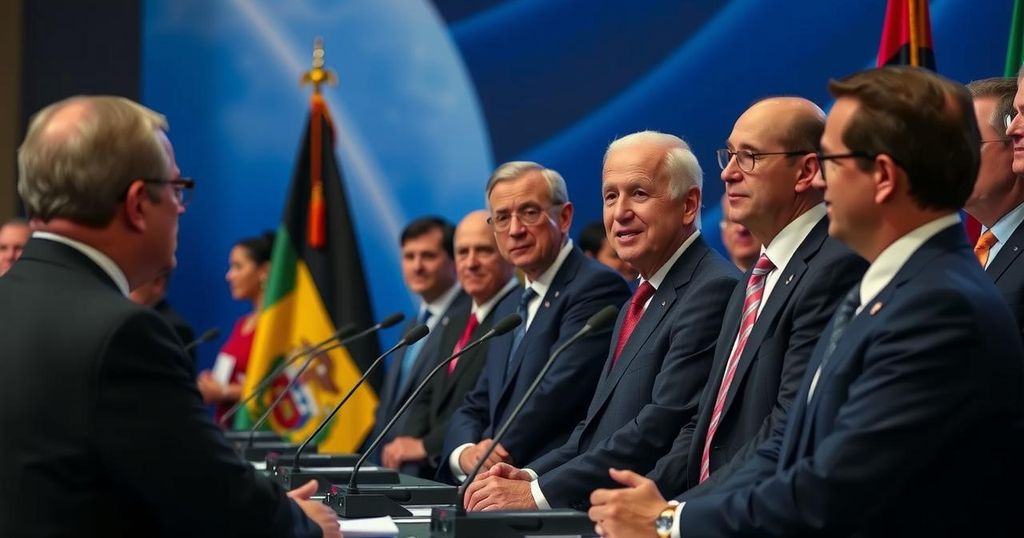Biden’s Strategic Visit to Peru and Brazil Amidst Trump’s Presidential Comeback

President Biden is set to undertake a six-day visit to Peru and Brazil, participating in significant international summits. His trip comes amid concerns about Donald Trump’s potential presidency and its implications for global alliances. The visit highlights Biden’s commitment to climate issues, support for Ukraine, and critical discussions with leaders, including Xi Jinping, addressing pressing geopolitical challenges as he wraps up his tenure.
President Joe Biden is set to embark on a six-day diplomatic journey to Peru and Brazil, commencing on Thursday. This visit will encompass participation in significant international summits, including the Asia-Pacific Economic Cooperation (APEC) summit and the Group of Twenty (G20) leaders’ summit. As Biden engages with leaders he has collaborated with throughout his presidency, the global political landscape is intensely focused on the implications of Donald Trump’s potential return to the White House, with world leaders already extending congratulations and assessing Trump’s prospective national security team. Although Biden is classified as a ‘lame duck’ president, his administration emphasizes the significance of this trip and the discussions that will take place concerning pressing issues like climate change and global infrastructure. Engagements are scheduled with influential leaders, including a one-on-one meeting with Chinese President Xi Jinping, highlighting Biden’s commitment to solidifying alliances and addressing major global challenges. The international summits present Biden with an opportunity to reassure allies of America’s support, particularly in the context of Ukraine amidst its ongoing conflict with Russia, and ongoing tensions in Gaza and Lebanon. Biden’s visit also marks the first time a sitting U.S. president has set foot in the Amazon rainforest, underscoring a strong environmental message. Experts connect this visit to a broader narrative of democratic power transitions, reinforcing that such changes are normal and expected in democracies. As Biden and Xi prepare for discussions, issues such as tariffs and U.S.-China relations will be crucial focal points, drawing on previous tensions and disputes over trade and security concerns. In addition, Biden’s administration is keen to emphasize support for Ukraine and address ongoing hostage situations in the region following the Hamas conflict, while laying out strategies for collaboration in an era of uncertainty following the Trump presidency. This summit and travels mark a pivotal moment to display international solidarity and strategic alliances as the world prepares for a potential shift in U.S. foreign policy under a new administration.
The article examines President Joe Biden’s imminent six-day visit to Peru and Brazil, emphasizing its significance as a diplomatic mission at the conclusion of his presidential tenure. The context involves rising global anxieties regarding the potential implications of Donald Trump’s return to the presidency. Key themes include discussions on international cooperation, security challenges, and Biden’s ongoing commitment to maintaining strong ties with allies. The backdrop encompasses evolving dynamics in U.S.-China relations, international conflicts, and the importance of addressing climate change and global infrastructure. As Biden interacts with world leaders, the uncertainties posed by a transitioning U.S. administration are paramount to global diplomacy.
In summary, President Joe Biden’s upcoming visit to Peru and Brazil signifies a critical diplomatic engagement as he faces the uncertainties of a potential Trump administration. The summits serve as a platform to reinforce alliances, particularly concerning ongoing global crises such as the situation in Ukraine, while also addressing significant bilateral issues with China. As Biden seeks to uphold the U.S. commitment to its allies, the preparation for a transition in leadership presents both challenges and a reaffirmation of democratic transitions in global governance. Ultimately, the discussions held during this trip may set the tone for future international relations.
Original Source: www.opb.org








